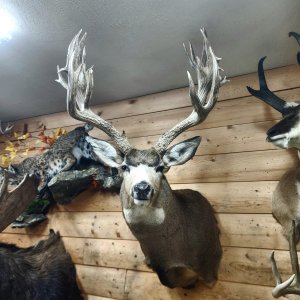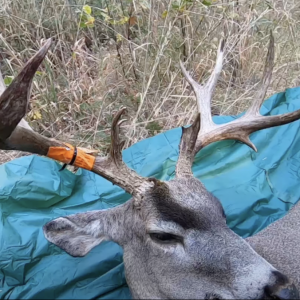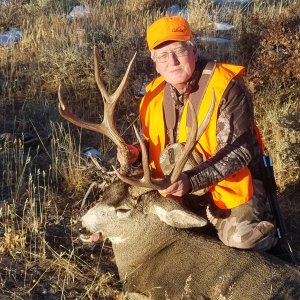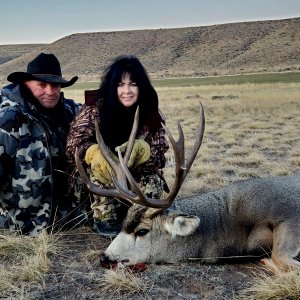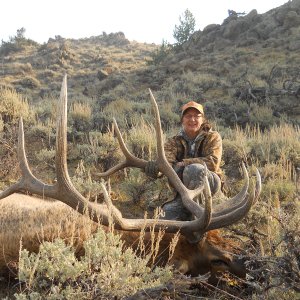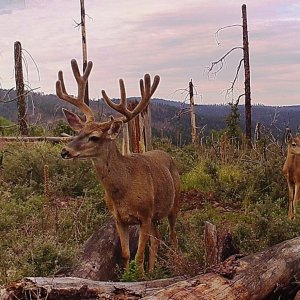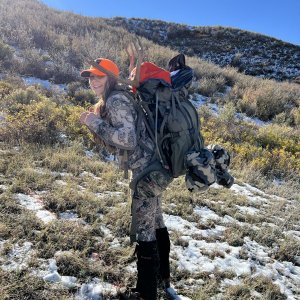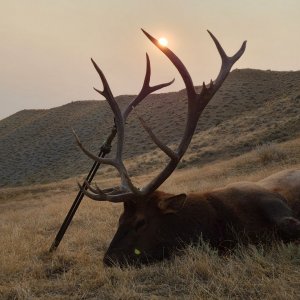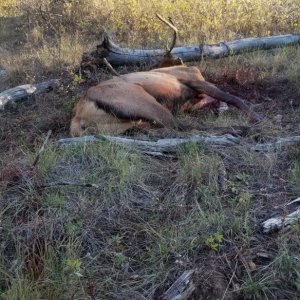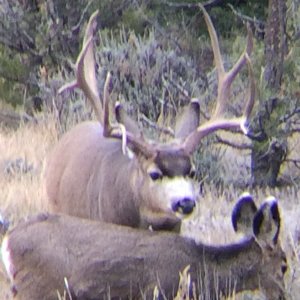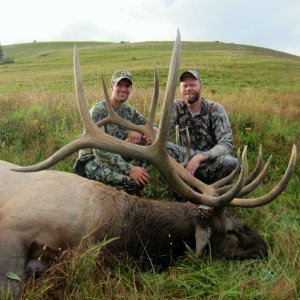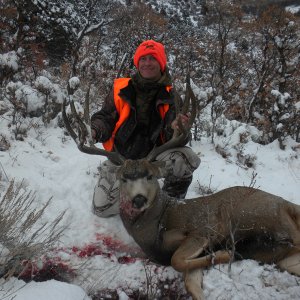Dean Parisian
Active Member
- Messages
- 440
RHAME, N.D.?After hours of scouting the bone-colored badlands at Cedar Ridge Elk Ranch here, hunter David Regal took aim and fired twice from his .300 Winchester Magnum rifle. One shot killed a bull elk that weighed 700 pounds, wore a 12-point set of antlers, and cost the shooter $8,500.
"I like to get the best there is," says Mr. Regal, 72 years old, who owns an excavating business in Michigan. He drove 1,100 miles here with his brother in a motor home, towing his black Hummer behind.
Cedar Ridge is one of North Dakota's dozen or so private hunting ranches, enclosed by high fences and stocked with farm-raised elk and deer. Here, well-to-do hunters like Mr. Regal pay for a guaranteed shot at some of the most majestic prey in the West.
On Nov. 2, North Dakota voters will decide on a ballot initiative that would do away with these ranches. What's surprising is that the battle over Ballot Measure 2 doesn't pit hunters against their natural adversaries, animal-rights activists, who have long opposed the ultimate blood sport. Rather, the debate is dividing hunters themselves.
As private hunting ranches proliferate nationwide, hunters are grappling with what it means to participate in one of the oldest American sports. Fights like the one in North Dakota have broken out elsewhere, and national hunting groups are piling into the debate.
On one side are hunters who say fencing in wildlife for profit is unethical and shifts hunting from its populist American roots. They say the reserves are creating an elitist model reminiscent of "King's hunting" for the European gentry long ago.
Leading the effort to ban the ranches in North Dakota is Roger Kaseman, a lifelong hunter who once lived off the land for two years in a remote Wyoming cabin. Private ranches are "handicapping the deer," says the 64-year-old, looking the quintessential mountain man with his full gray beard and thick hands. "We're selling off our hunting heritage."
Opposing the ban are hunters who contend the ranches offer a first-class hunting experience to outdoor enthusiasts while pumping money into rural economies. The measure is "an attack on hunting," says Shawn Schafer, who's executive director of the North American Deer Farmers Association, representing U.S. deer farmers and hunting ranches. Ban opponents also say the proposal threatens North Dakotans' property rights because the ranches are on private land.
The fight is playing out against a long, steady decline in hunting as an American sport. Nearly every year for the past 20, the number of hunting licenses issued in the U.S. has dropped, as older hunters retire, younger people choose other sports and rural populations decline, according to the U.S. Fish and Wildlife Service. Today, hunters make up less than 5% of the U.S. population, a record low.
Hunting has long held a special place in American culture. Early on, explorers and traders hunted game for meat and donned skins for clothing. They also fostered a hunting heritage radically different from what they had left in Europe. Here, wild game was to be held in the public trust, rather than in private game reserves available only to the elite.
President Theodore Roosevelt, an avid hunter and conservationist who built a cabin in North Dakota to hunt bison, helped cultivate the American tradition of "fair chase." The philosophy: A hunt should involve a skilled sportsman tracking free-ranging wildlife that have every opportunity to evade the pursuer. According to this creed?which emerged when big-game populations in the U.S. were dwindling amid overhunting?the hunt, rather than the kill, is the objective.
"The experience of being out in the wild and spending some time chasing elk is good for the soul," says Rod Gilmore, North Dakota regional director of the Rocky Mountain Elk Foundation, which is supporting the move to get rid of the private hunting ranches. "I could never see any personal satisfaction in shooting something that can't get away."
Hunter Ken Collette of Seattle opens a gate at the Cedar Ridge Elk Ranch in Rhame, N.D., where he said he hoped to get "a chance to finally shoot an elk."
With its vast stretches of golden prairies crossed by ragged peaks, North Dakota has long been a hunter's paradise. Lodges cater to hunters who come from across the U.S. to hunt deer, elk, moose, pheasant and quail.
The big "shooting ranches" that buy their own animals and then fence them in began to sprout in the past 20 years or so. They came about partly because of James Kroll, a Nacogdoches, Texas, biologist who in the late 1980s developed a way to artificially inseminate white-tailed deer. The breakthrough opened opportunities for deer and elk farmers who previously had raised the animals as hobbies or for niche businesses like wildlife photography.
As more breeders adopted Mr. Kroll's methods in the 1990s, farm-raised deer and elk kept getting bigger. Hunting ranches began buying them. As demand for the animals rose, so did their value, which enticed more people into breeding.
Soon deer and elk were being farmed and bred like cattle and hogs, using sophisticated genetics and in-vitro fertilization. "Super breeder bucks" were fed high-protein diets to bulk up their bodies and give them unusually large antlers. "We produced deer that no one ever thought we could produce," says Mr. Kroll, who's also known as "Dr. Deer."
Take "Sudden Impact," a white-tailed deer raised at Wilderness Whitetails in Stevens Point, Wis. Before the "monster buck" died last year at the age of three, its antlers had grown so large that its head wobbled under their weight.
Today, there are more than 7,000 deer-and-elk breeding operations and 2,600 hunting ranches in the U.S., according to a 2007 study by the Agricultural and Food Policy Center at Texas A&M University. The best animals are being sold at auction for as much as $10,000 apiece, either as breeding stock to farms or "shooter bucks" to hunting ranches. Raising deer and elk and hunting them on private ranches has become a $3 billion business.
Mr. Schafer, a leader of the opposition to the proposed ranch ban, traded cattle ranching for deer farming in 1998 because he says the latter is more lucrative and fun. "I've always had a fascination with deer," says the lifelong hunter and trapper. His 80-acre farm in Turtle Lake, N.D., produces whitetails that he sells to hunting ranches across the U.S.
As the farmed prey was growing larger, the hunting world also was changing.
Many hunters found they had less time to go on traditional wilderness hunts. With land being eaten up by suburban sprawl, access to hunting lands grew more limited. Hunters also complained that trophies were harder to find on heavily hunted public lands. Private landowners started charging to hunt in their fields and woods.
Private ranches offered hunters a convenient and expeditious way to raise their odds of killing an animal?a really big animal.
About 40 bull elk roam the 2,000 acres of sagebrush and cedar groves enclosed by eight-foot-tall wire fences at Cedar Ridge Elk Ranch in the southwestern corner of North Dakota. Owner Willard Swanke, 67, turned the third-generation cattle ranch into an elk-hunting ranch in 1996, to keep the property in his family in the face of a depressed farm economy.
Mr. Regal, the Michigan businessman who shot the 700-pound elk recently, is one of about 25 hunters who come to Cedar Ridge each year. For the chance to bag a trophy, they pay from $4,000 to more than $8,500, depending on the size of an elk's antlers. That price typically includes lodging at the ranch's charming log cabins and meals cooked by Mr. Swanke's wife, Barb.
Cedar Ridge's website says, "We guarantee success or the hunt is free!" But Mr. Swanke says only "once in a great while" will a hunter go away empty-handed. As Mr. Regal did, hunters can have their kills processed into sausage and steak in nearby Rhame, population 174.
Mr. Regal says he's gone on many hunts, including a week-long one in the 1960s in the Wyoming wilderness on horseback. Today, he says, "hunting public lands is a waste." At Cedar Ridge, "you're assured of getting game." He says he feels the hunt was fair. "There's enough territory there that [the elk] can outsmart you," he says.
Mr. Swanke says that if Ballot Measure 2 passes, he'll have to shut his business and go back to raising cattle.
"My operation isn't for everybody," he says. "But what I'm doing is healthy and legal. I'm not ashamed of it."
Mr. Kaseman, the force behind the ballot initiative, thinks otherwise.
He grew up in North Dakota before moving to California to work as a forensic investigator. After retiring, he moved back to his hometown of Wishek, N.D., in 1997 to spend time hunting deer and pheasant. When he learned about the shooting ranches, he recalls, "I thought, 'This isn't right.'"
He has never been to a shooting ranch, but he hasn't been to a brothel either, he says, and he dislikes those, too. The largest animal he ever killed, he says, was "a not too terribly big" yearling moose. He has some antlers mounted in his home, but he's "not big into trophies and all that."
Two years ago, he and three other hunters established the North Dakota Hunters for Fair Chase. They fell short of gathering the 12,844 signatures needed to put a ban proposal on the 2008 ballot. Last year, Mr. Kaseman set out on a statewide tour, setting up his group's booth at the Home Show in Bismarck, the state fair in Minot and various gun shows.
Rumors circulated that his group was a front for the Humane Society of the United States. He displayed photos of himself in fluorescent orange hunting gear and asked people, "Does this guy look like an animal-rights activist?" A spokesman for the Humane Society says it helped solicit signatures in 2008, but has played no role in this year's campaign, at Mr. Kaseman's request.
This year, Fair Chase gathered 13,860 signatures, more than enough. If the measure passes, it would make it a misdemeanor for a person to take money for the killing or attempted killing of privately owned animals in an enclosure.
Mr. Kaseman's Fair Chase group has the verbal backing of the Rocky Mountain Elk Foundation, the Mule Deer Foundation and Orion the Hunter's Institute, all hunting groups. Mr. Kaseman counts about $20,000 in his group's campaign fund and has been soliciting deer hunters whose names and email addresses he got from the state Game and Fish Department.
"Every hunter worth his or her sweaty socks knows that there is no hunting involved inside an escape proof pasture," the emails say. They request a $16.50 donation: "Less than a box of 30-06 shells," a type of rifle ammunition. Mr. Kaseman plans to use some of the money for ads on an AM radio station that reaches rural areas, where "you can get the farmer in the field driving his combine." He says every day he receives stacks of letters with checks, as well as some hate mail.
View Full Image
Matt McLoone for The Wall Street Journal
Two of the 40 bull elk, right, that roam the enclosed ranch.
The effort faces formidable opposition. The Citizens to Preserve North Dakota Property Rights group enjoys the support of the National Rifle Association, the National Deer Farmers Association, Safari Club International, North Dakota Stockmen's Association and the North Dakota Farm Bureau.
Rather than debate the ethics of hunting, the opponents are framing the proposed ban as a violation of personal property rights that would force ranches out of business and owners off of their property.
"We can't afford to lose," says Mr. Schafer, executive director of the Deer Farmers Association, who organized the larger opposition group. "Our livelihood is on the line."
Mr. Schafer says Citizens to Preserve North Dakota Property Rights plans to spend up to $200,000 to defeat the ranch ban. The group is running radio and newspaper ads and has posted billboards on the state's highways saying, "Protect Our State's Rights."
The NRA hasn't supplied money, but has sent mail and email alerts to its tens of thousands of North Dakota members urging them to vote against the measure. "We believe that hunters should be free to choose the way they want to do things," says Darren LaSorte, manager for hunting policy at the NRA's lobbying arm in Fairfax, Va.
Both sides say they consider the issue nonpartisan. No polls on the initiative are available, but Mr. Kaseman cites a 2007 survey conducted by the University of North Dakota at the request of him and some wildlife groups. Of 600 people polled, 75% said they would vote "yes" on a ban.
Back at Cedar Ridge Elk Ranch one recent day, owner Mr. Swanke stood on a ridge overlooking miles of multicolored rock formations plunging toward the Little Missouri River. The sound of bugling elk echoed through the valley. "This is where you can forget you're fenced in," he said, gesturing with his hands toward the horizon.
www.chippewapartners.com
"I like to get the best there is," says Mr. Regal, 72 years old, who owns an excavating business in Michigan. He drove 1,100 miles here with his brother in a motor home, towing his black Hummer behind.
Cedar Ridge is one of North Dakota's dozen or so private hunting ranches, enclosed by high fences and stocked with farm-raised elk and deer. Here, well-to-do hunters like Mr. Regal pay for a guaranteed shot at some of the most majestic prey in the West.
On Nov. 2, North Dakota voters will decide on a ballot initiative that would do away with these ranches. What's surprising is that the battle over Ballot Measure 2 doesn't pit hunters against their natural adversaries, animal-rights activists, who have long opposed the ultimate blood sport. Rather, the debate is dividing hunters themselves.
As private hunting ranches proliferate nationwide, hunters are grappling with what it means to participate in one of the oldest American sports. Fights like the one in North Dakota have broken out elsewhere, and national hunting groups are piling into the debate.
On one side are hunters who say fencing in wildlife for profit is unethical and shifts hunting from its populist American roots. They say the reserves are creating an elitist model reminiscent of "King's hunting" for the European gentry long ago.
Leading the effort to ban the ranches in North Dakota is Roger Kaseman, a lifelong hunter who once lived off the land for two years in a remote Wyoming cabin. Private ranches are "handicapping the deer," says the 64-year-old, looking the quintessential mountain man with his full gray beard and thick hands. "We're selling off our hunting heritage."
Opposing the ban are hunters who contend the ranches offer a first-class hunting experience to outdoor enthusiasts while pumping money into rural economies. The measure is "an attack on hunting," says Shawn Schafer, who's executive director of the North American Deer Farmers Association, representing U.S. deer farmers and hunting ranches. Ban opponents also say the proposal threatens North Dakotans' property rights because the ranches are on private land.
The fight is playing out against a long, steady decline in hunting as an American sport. Nearly every year for the past 20, the number of hunting licenses issued in the U.S. has dropped, as older hunters retire, younger people choose other sports and rural populations decline, according to the U.S. Fish and Wildlife Service. Today, hunters make up less than 5% of the U.S. population, a record low.
Hunting has long held a special place in American culture. Early on, explorers and traders hunted game for meat and donned skins for clothing. They also fostered a hunting heritage radically different from what they had left in Europe. Here, wild game was to be held in the public trust, rather than in private game reserves available only to the elite.
President Theodore Roosevelt, an avid hunter and conservationist who built a cabin in North Dakota to hunt bison, helped cultivate the American tradition of "fair chase." The philosophy: A hunt should involve a skilled sportsman tracking free-ranging wildlife that have every opportunity to evade the pursuer. According to this creed?which emerged when big-game populations in the U.S. were dwindling amid overhunting?the hunt, rather than the kill, is the objective.
"The experience of being out in the wild and spending some time chasing elk is good for the soul," says Rod Gilmore, North Dakota regional director of the Rocky Mountain Elk Foundation, which is supporting the move to get rid of the private hunting ranches. "I could never see any personal satisfaction in shooting something that can't get away."
Hunter Ken Collette of Seattle opens a gate at the Cedar Ridge Elk Ranch in Rhame, N.D., where he said he hoped to get "a chance to finally shoot an elk."
With its vast stretches of golden prairies crossed by ragged peaks, North Dakota has long been a hunter's paradise. Lodges cater to hunters who come from across the U.S. to hunt deer, elk, moose, pheasant and quail.
The big "shooting ranches" that buy their own animals and then fence them in began to sprout in the past 20 years or so. They came about partly because of James Kroll, a Nacogdoches, Texas, biologist who in the late 1980s developed a way to artificially inseminate white-tailed deer. The breakthrough opened opportunities for deer and elk farmers who previously had raised the animals as hobbies or for niche businesses like wildlife photography.
As more breeders adopted Mr. Kroll's methods in the 1990s, farm-raised deer and elk kept getting bigger. Hunting ranches began buying them. As demand for the animals rose, so did their value, which enticed more people into breeding.
Soon deer and elk were being farmed and bred like cattle and hogs, using sophisticated genetics and in-vitro fertilization. "Super breeder bucks" were fed high-protein diets to bulk up their bodies and give them unusually large antlers. "We produced deer that no one ever thought we could produce," says Mr. Kroll, who's also known as "Dr. Deer."
Take "Sudden Impact," a white-tailed deer raised at Wilderness Whitetails in Stevens Point, Wis. Before the "monster buck" died last year at the age of three, its antlers had grown so large that its head wobbled under their weight.
Today, there are more than 7,000 deer-and-elk breeding operations and 2,600 hunting ranches in the U.S., according to a 2007 study by the Agricultural and Food Policy Center at Texas A&M University. The best animals are being sold at auction for as much as $10,000 apiece, either as breeding stock to farms or "shooter bucks" to hunting ranches. Raising deer and elk and hunting them on private ranches has become a $3 billion business.
Mr. Schafer, a leader of the opposition to the proposed ranch ban, traded cattle ranching for deer farming in 1998 because he says the latter is more lucrative and fun. "I've always had a fascination with deer," says the lifelong hunter and trapper. His 80-acre farm in Turtle Lake, N.D., produces whitetails that he sells to hunting ranches across the U.S.
As the farmed prey was growing larger, the hunting world also was changing.
Many hunters found they had less time to go on traditional wilderness hunts. With land being eaten up by suburban sprawl, access to hunting lands grew more limited. Hunters also complained that trophies were harder to find on heavily hunted public lands. Private landowners started charging to hunt in their fields and woods.
Private ranches offered hunters a convenient and expeditious way to raise their odds of killing an animal?a really big animal.
About 40 bull elk roam the 2,000 acres of sagebrush and cedar groves enclosed by eight-foot-tall wire fences at Cedar Ridge Elk Ranch in the southwestern corner of North Dakota. Owner Willard Swanke, 67, turned the third-generation cattle ranch into an elk-hunting ranch in 1996, to keep the property in his family in the face of a depressed farm economy.
Mr. Regal, the Michigan businessman who shot the 700-pound elk recently, is one of about 25 hunters who come to Cedar Ridge each year. For the chance to bag a trophy, they pay from $4,000 to more than $8,500, depending on the size of an elk's antlers. That price typically includes lodging at the ranch's charming log cabins and meals cooked by Mr. Swanke's wife, Barb.
Cedar Ridge's website says, "We guarantee success or the hunt is free!" But Mr. Swanke says only "once in a great while" will a hunter go away empty-handed. As Mr. Regal did, hunters can have their kills processed into sausage and steak in nearby Rhame, population 174.
Mr. Regal says he's gone on many hunts, including a week-long one in the 1960s in the Wyoming wilderness on horseback. Today, he says, "hunting public lands is a waste." At Cedar Ridge, "you're assured of getting game." He says he feels the hunt was fair. "There's enough territory there that [the elk] can outsmart you," he says.
Mr. Swanke says that if Ballot Measure 2 passes, he'll have to shut his business and go back to raising cattle.
"My operation isn't for everybody," he says. "But what I'm doing is healthy and legal. I'm not ashamed of it."
Mr. Kaseman, the force behind the ballot initiative, thinks otherwise.
He grew up in North Dakota before moving to California to work as a forensic investigator. After retiring, he moved back to his hometown of Wishek, N.D., in 1997 to spend time hunting deer and pheasant. When he learned about the shooting ranches, he recalls, "I thought, 'This isn't right.'"
He has never been to a shooting ranch, but he hasn't been to a brothel either, he says, and he dislikes those, too. The largest animal he ever killed, he says, was "a not too terribly big" yearling moose. He has some antlers mounted in his home, but he's "not big into trophies and all that."
Two years ago, he and three other hunters established the North Dakota Hunters for Fair Chase. They fell short of gathering the 12,844 signatures needed to put a ban proposal on the 2008 ballot. Last year, Mr. Kaseman set out on a statewide tour, setting up his group's booth at the Home Show in Bismarck, the state fair in Minot and various gun shows.
Rumors circulated that his group was a front for the Humane Society of the United States. He displayed photos of himself in fluorescent orange hunting gear and asked people, "Does this guy look like an animal-rights activist?" A spokesman for the Humane Society says it helped solicit signatures in 2008, but has played no role in this year's campaign, at Mr. Kaseman's request.
This year, Fair Chase gathered 13,860 signatures, more than enough. If the measure passes, it would make it a misdemeanor for a person to take money for the killing or attempted killing of privately owned animals in an enclosure.
Mr. Kaseman's Fair Chase group has the verbal backing of the Rocky Mountain Elk Foundation, the Mule Deer Foundation and Orion the Hunter's Institute, all hunting groups. Mr. Kaseman counts about $20,000 in his group's campaign fund and has been soliciting deer hunters whose names and email addresses he got from the state Game and Fish Department.
"Every hunter worth his or her sweaty socks knows that there is no hunting involved inside an escape proof pasture," the emails say. They request a $16.50 donation: "Less than a box of 30-06 shells," a type of rifle ammunition. Mr. Kaseman plans to use some of the money for ads on an AM radio station that reaches rural areas, where "you can get the farmer in the field driving his combine." He says every day he receives stacks of letters with checks, as well as some hate mail.
View Full Image
Matt McLoone for The Wall Street Journal
Two of the 40 bull elk, right, that roam the enclosed ranch.
The effort faces formidable opposition. The Citizens to Preserve North Dakota Property Rights group enjoys the support of the National Rifle Association, the National Deer Farmers Association, Safari Club International, North Dakota Stockmen's Association and the North Dakota Farm Bureau.
Rather than debate the ethics of hunting, the opponents are framing the proposed ban as a violation of personal property rights that would force ranches out of business and owners off of their property.
"We can't afford to lose," says Mr. Schafer, executive director of the Deer Farmers Association, who organized the larger opposition group. "Our livelihood is on the line."
Mr. Schafer says Citizens to Preserve North Dakota Property Rights plans to spend up to $200,000 to defeat the ranch ban. The group is running radio and newspaper ads and has posted billboards on the state's highways saying, "Protect Our State's Rights."
The NRA hasn't supplied money, but has sent mail and email alerts to its tens of thousands of North Dakota members urging them to vote against the measure. "We believe that hunters should be free to choose the way they want to do things," says Darren LaSorte, manager for hunting policy at the NRA's lobbying arm in Fairfax, Va.
Both sides say they consider the issue nonpartisan. No polls on the initiative are available, but Mr. Kaseman cites a 2007 survey conducted by the University of North Dakota at the request of him and some wildlife groups. Of 600 people polled, 75% said they would vote "yes" on a ban.
Back at Cedar Ridge Elk Ranch one recent day, owner Mr. Swanke stood on a ridge overlooking miles of multicolored rock formations plunging toward the Little Missouri River. The sound of bugling elk echoed through the valley. "This is where you can forget you're fenced in," he said, gesturing with his hands toward the horizon.
www.chippewapartners.com


